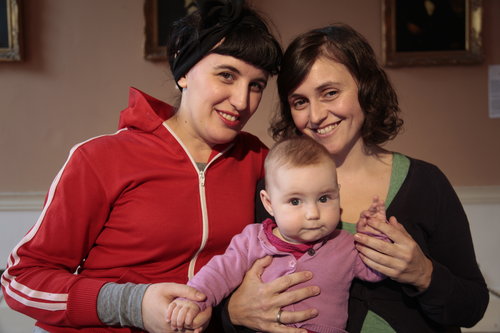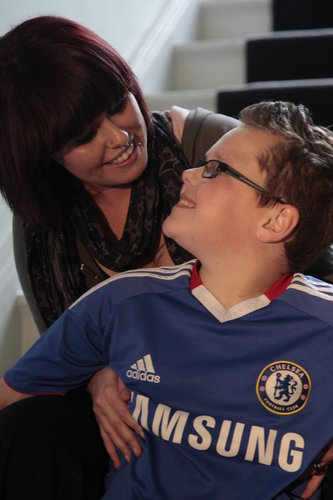What the Civil Partnership Act 2010 means for families
"The distinction created by the [Civil Partnership] Bill between the children of civil partners and children provided for under other parts of family law - such as children in step-families - is arbitrary from the children's point of view. It is untenable to argue that their need for support, financial security and protection is any less important than the needs of other children, or that this difference in treatment could be justified on the basis of those children's interests.
It is clear therefore that the best interests of the children of civil partners were not a primary consideration in drafting the provisions of the Civil Partnership Bill that related to them. It is concerning that such an approach, so out of step with the principle set out in Article 3 of the UNCRC (best interests of the child), could underpin our lawmaking process."
Annual Report, Ombudsman For Children, 2010 (p.31)

Marriage Equality's commitment to securing civil marriage rights for same-sex couples includes a determination to help secure equal rights and protections for same sex parents and their children.
As you may or may not know, the Civil Partnership Act failed to resolve any legal issues pertaining to same sex parents and their children. This means that the children of same sex parents are neither recognised nor protected by the State. In addition, de facto (non-biological) parents are left out in the cold with no parental responsibilities or entitlements. For more information on the differences between Civil Partnership and civil marriage, please see our "Missing Pieces" report.
Emotional Implications
With no legal recognition of same sex relationships, many professionals, such as doctors and teachers, as well as friends and relatives, tend not to see our families as a family unit, and therefore lack the atmosphere of approval and support that every family needs.
An Italian research study into the challenges and opportunities for LGBT families found that schools usually adopt a heteronormative response to same sex families, not giving them legitimacy but tolerating them, preferring them to remain secret, so the non-biological parent often remains invisible. The study showed that children usually adopted a 'trial & error' disclosure strategy, depending on their age, peer and teachers response and the perceived levels of support.
These findings were echoed in our own Voices of Children report, where children of LGBT parents reported experiencing instances of homophobia in schools, hospitals, churches and private spaces. They also touched on the issue of "coming out" as children of LGBT parents - but noted that factors such as the presence of supportive peers, a positive environment, and their age/life stage affected when and if they chose to disclose.
This has considerable implications for children's well being, as children need to be accepted in their environment and need to have peers and teachers acknowledge them and their families just as they are. Children should not have to live with secrets, particularly not big secrets like not telling anyone who their parents are.
For parents, this lack of legal protections means they often live in constant fear that they will lose their parental rights. This, coupled with the pressures and stress associated with being a lesbian or gay parent in an unsupportive society, can put a heavy strain on LGBT individuals and couples.
"I still don't really talk openly about it, about this whole issue. I do when I'm around adults, and around family but around my friends I'm just not comfortable yet so that's a big issue for me."
Anonymous participant - Voices of Children
Legal Implications
Alongside the emotional implications for same sex families there are also considerable legal and financial issues which have very real consequences for same sex parents and their children in everyday situations.
 With no mechanism for legal recognition of de facto parents, children do not have any rights to their de facto parent - even when that parent has raised them since birth. And so, for example, a de facto parent cannot be appointed guardian by the court or even by agreement of the natural parents, nor can de facto parents be granted custody of their children.
With no mechanism for legal recognition of de facto parents, children do not have any rights to their de facto parent - even when that parent has raised them since birth. And so, for example, a de facto parent cannot be appointed guardian by the court or even by agreement of the natural parents, nor can de facto parents be granted custody of their children.
Our short film Rory's Story highlights what the implications of such inequalities can be.
Having a registered civil partnership will not change this and starkly highlights the inequality between the Civil Partnership Act and civil marriage.
"Even something as simple as being sick in school - they can't come and collect you. They're: 'you have to have your parent', and you're like: 'she's coming to collect me, she is my parent', and they're like: 'no she's not'. [...] The fundamental, the day-to-day stuff; it gets - there is a hindrance for us..."
Anonymous participant - Voices of Children
A clear example of the unequal treatment of children of same sex parents in the Civil Partnership Act is demonstrated in relation to the lack of legal obligations to maintain dependent children. Under the Family Law (Maintenance of Spouses and Children) Act, 1976 (as amended) spouses have a legal obligation to maintain dependent children of the family. This includes children who are not their biological children, such as step-children, or children from their spouse's previous relationship.
This obligation does not apply to civil partners in the Civil Partnership Act, which means children being raised in same sex families are deliberately being discriminated against on the grounds of their parents' sexual orientation.
Financial Implications
State supports designed to provide financial assistance to families are generally based on marriage or the legal recognition of parenthood, leaving same sex families at a financial disadvantage and additionally vulnerable to economic hardship. Despite welcome progress in removing some of the 'missing pieces' in the Civil Partnership Act - particularly those dealing with finance and taxation - there are still a number of gaps where the range of civil partners' family members are not covered.
Under income tax provisions for example, tax credits and reliefs designed to assist families in times of difficulty are only available to spouses or legally recognised parents and guardians. This includes payments such as the Widowed Parent tax credit, One Parent tax credit, Home Carer's tax credit & Medical Expenses relief.
There are also gaps remaining between a de facto parent and child. For example, under the Civil Partnership Act there is no obligation on a former civil partner to pay child support following the dissolution of a civil partnership; however, if a person is making such payments they cannot currently avail of tax relief on these payments whereas a former married spouse can.



 Marriage Equality is a proud member of NELFA
Marriage Equality is a proud member of NELFA